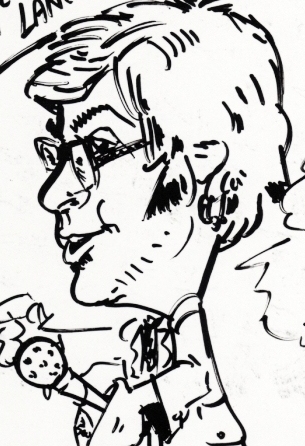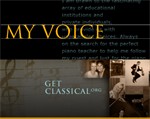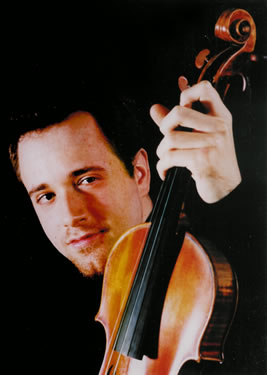Welcome to our free classical music site

Do you write about classical music? Are you a blogger? Want to team up with Classical Connect? Send us a message, let's talk!

Do you write about classical music? Are you a blogger? Want to team up with Classical Connect? Send us a message, let's talk!
August 22, 2011
Today is the anniversary of the great French composer Claude Debussy’s birthday: he was born on this date in 1862 in Saint-Germain-en-Laye, just outside of Paris. His music, while highly original, was almost instantly accepted by the listening public, and for the last 90 years he has been and remains one of the most widely performed classical composers. Debussy was eighteen when he started writing music. The earliest composition in our library is the song cycle Quatre Chansons De Jeunesse, written in 1881-1882. Here’s the song Claire de lune, performed by the soprano Tina Beverly with William Billingham on the piano. Debussy used the same title for the third movement of his Suite Bergamasque, another early work (it was written in 1890). You can listen to the complete Suite here as played by the young Chinese pianist Xiang Zou. In 1884 Debussy won the Prix de Rome, an award which included a residence at the Villa Medici, the French Academy in Rome. Debussy spent three years in Rome, from 1885 to 1887. His return to Paris traditionally marks the beginning of his “middle period.” Among many pieces written during those years is the piano cycle Estampes (1903). Here’s Pagodes, from Estampes, played by the pianist Miyuki Otani. The first book of Préludes is usually also attributed to this period, even though just three years separate it from the second volume, considered to be a late work. Here’s the fourth prelude from Book I, with the evocative title The sounds and fragrances swirl through the evening air (Les sons et les parfums tournent dans l'air du soir). It’s performed by the Italian pianist Roberto Russo. Book II of Préludes was written in 1913. Here’s prelude number four, Bruyères, played by the pre-eminent Mexican pianist Jorge Federico Osorio. The last composition completed by Debussy was his Sonata for Violin and Piano, performed here by Nathan Cole, violin, and Kuang-Hao Huang, piano. He finished it in 1917. Several months later, on March 25, 1918, during the German bombardment of Paris, Debussy died of cancer. We look forward to the next year when we’ll join the world’s classical community in celebrating the 150th anniversary of his birthday.
August 15, 2011. Boyce Lancaster interviews the violinist Vadim Gluzman. They sat down while Vadim was visiting Columbus, OH to play Mendelsshon’s Concerto in d minor for Violin and Strings with ProMusica (Mendelsshon was 13 when he composed this piece). An Israeli violinist, Vadim was born in Russia and currently resides in Chicago (he teaches at the Roosevelt University). Boyce and Vadim talked about Alfred Schnittke, Felix Mendelsshon’s, and the young composer Lera Auerbach. We can offer you two samples of Vadim’s art. Here's his performance of Brahms’s Violin Concerto with the Symphony Orchestra of Saarbrücken Radio, Günther Herbig conduction and here – an excerpt from Lera Auerbach’s Double Concerto, which he plays with his wife, the pianist Angela Yoffe, and the Stuttgart Radio Symphony Orchestra, Andrei Boreyko conduction. You can listen to the interview here, and below is Boyce’s introduction to his conversation with Vadim.
to play Mendelsshon’s Concerto in d minor for Violin and Strings with ProMusica (Mendelsshon was 13 when he composed this piece). An Israeli violinist, Vadim was born in Russia and currently resides in Chicago (he teaches at the Roosevelt University). Boyce and Vadim talked about Alfred Schnittke, Felix Mendelsshon’s, and the young composer Lera Auerbach. We can offer you two samples of Vadim’s art. Here's his performance of Brahms’s Violin Concerto with the Symphony Orchestra of Saarbrücken Radio, Günther Herbig conduction and here – an excerpt from Lera Auerbach’s Double Concerto, which he plays with his wife, the pianist Angela Yoffe, and the Stuttgart Radio Symphony Orchestra, Andrei Boreyko conduction. You can listen to the interview here, and below is Boyce’s introduction to his conversation with Vadim.
PermalinkVadim Gluzman: Music’s Fearless Champion
I recently read an interview Vadim Gluzman did with Laurie Niles for violinist.com in he told the story of how he came to play the violin. Gluzman was six years old when he took examinations for entrance into a specialized school for musically gifted children in what was then the Soviet Union. At one point, members of the panel examined his hands, which Gluzman said he thought was to make sure his fingernails were clean. The following day, Vadim saw his name on a list of those accepted for study. Next to his name, it said “Скрипка,” (roughly pronounced “Skripka”) which means violin. Gluzman said he had a fit, because he and his father, Michael, had designs on him studying piano, which his father had described to him as the king of instruments, rather than the violin, which his father described as the queen.
Thirty years later, Gluzman concedes that, indeed, his hands are perfectly suited for the violin, though he still marvels at how they knew by examining the hands of a six-year-old boy that he was born to play the violin.
August 8, 2011
Rachmaninov’s Piano Concerto no. 4. By the time Sergei Rachmaninov emigrated from Russia in December of 1917 he was of 44, and had already written most of his most successful compositions: the Second and Third Piano Concertos, two piano sonatas, two sets of Études-Tableaux, two sets of piano Preludes and other piano pieces, two symphonies, the symphonic poem Isle of the Dead, and the choral symphony The Bells. In fact, in the last 26 years of his life Rachmaninov wrote only five significant pieces: Piano Concerto no. 4 (in 1926, revised in 1941), piano Variations on a Theme of Corelli (in 1931), the ever-popular Rhapsody on a Theme of Paganini for piano and orchestra (in 1936), Symphony No. 3 (in 1941), and the orchestral Symphonic Dances.
The story of the Piano Concerto no. 4 Op. 40 is very interesting. Rachmaninov wrote it in 1926. He showed the score to his friends, the composer Nikolai Medtner (to whom he dedicated the Concerto) and the pianist Joseph Hoffman. Both liked the score and were very supportive. Rachmaninov, on the other hand, felt very insecure about the piece: he apparently thought that the 3rd movement was too long and not dynamic enough, and that there was “too much orchestra” (it’s true that the orchestra plays practically throughout the duration of the concerto, but the same could be said about the Second concerto, and why would that be wrong in itself is not at all clear). The concerto was premiered in Philadelphia in March of 1927; Rachmaninov himself played the piano, with Leopold Stokowski conducting the Philadelphia Orchestra (during that time Rachmaninov played the concerto five more times). The reception was universal – and highly negative. The discouraged Rachmaninov made a number of cuts to the score and published it in 1928. In 1941 he revised the concerto again, making more cuts and considerably changing the Finale. Rachmaninov premiered the revised version in 1941, also with the Philadelphia Orchestra, but in this case under the baton of Eugene Ormandi. The public reception, if somewhat better than in 1927, was rather cool, and Rachmaninov himself was left unsatisfied with the orchestral part.
Some musicians, Vladimir Ashkenazy in particular, believe that the original uncut manuscript version of 1926 was superior to all the revisions, and that the composer “got it right” the first time around. The original manuscript became available to the public only in 2003 when it was published by Boosey and Hawke; very few recordings of it have been made since then. You can hear one as performed by the pianist Eteri Andjaparidze, with Pascal Verrot conducting the Round Top Festival Orchestra. To listen, click here.
August 1, 2011. Boyce Lancaster interviews the famous American lutenist and baroque guitarist Hopkinson Smith. Since the early 1970s Mr. Smith has been living in Switzerland. He was one of the founders of Hespèrion XX, an international early music ensemble. Mr. Smith plays different plucked string instruments, including the vihuela (called viola da mano in Italy), Renaissance lute, theorbo, Renaissance and Baroque guitars and the baroque lute. During the interview he plays music of the Spanish Baroque composers Gaspar Sanz and Francisco Guerau. Here’s Boyce:
Since the early 1970s Mr. Smith has been living in Switzerland. He was one of the founders of Hespèrion XX, an international early music ensemble. Mr. Smith plays different plucked string instruments, including the vihuela (called viola da mano in Italy), Renaissance lute, theorbo, Renaissance and Baroque guitars and the baroque lute. During the interview he plays music of the Spanish Baroque composers Gaspar Sanz and Francisco Guerau. Here’s Boyce:
A tall, slender gentleman with a regal bearing glides toward me, extends his hand, and says “Hello, I’m Hopkinson Smith.” His voice is soft, not unlike the instrument he plays, but at the same time, he commands attention as he speaks. He chooses his words carefully, describing his instruments and the music he plays as a painter describes what he sees with a brush. His accent is unique and rests pleasantly on the ears…an amalgamation of his life in the Northeastern United States and his current home in Switzerland, where he teaches at the Schola Cantorum Basiliensis.
In my conversation with Hopkinson Smith, I learned that he played electric guitar, horn, saxophone, and trumpet, among many other instruments. If there was an instrument missing in the band, he would simply pick it up and figure it out on his own. He was about 17 when he discovered the classical guitar. After a couple of years, the lute caught his attention. He would soon move to Europe to study with Emilio Pujol, who had once been a student of Francisco Tarrega.
In the years since, he has expanded his expertise to include many instruments, renaissance lute, vihuela, theorbo, Renaissance and baroque guitars and the baroque lute among them. He has release 20+ solo recordings on these various instruments, as well as collaborating with many of the world’s greatest musicians. He was involved in the founding of the ensemble Hesperion XX and collaborated for some ten years with Jordi Savall, who also teaches at Schola Cantorum Basiliensis.
I could go on, but it is far more interesting to hear in Hopkinson Smith’s own words. Here’s the interview.Permalink
 Our friends at GetClassical recently wrote about the talented Israeli violinist and composer Ittai Shapira. His Concierto Latino, inspired by Latin dances and based on elements of Tango and Flamenco, premiered in 2008. You can listen to the final movement ("The Party") here, it’s performed by Ittai with London Serenata, Krzysztof Chorzelski, conductor. You can also listen to Frédéric Chopin’s Polonaise Brilliante arrange by Ittai for violin and piano, performed by him and the pianist Jeremy Denk (here). And here you can listen to the 3rd movement of the violin concerto by the brilliant Israeli composer Avner Dorman. Here is what GetClassical wrote about Ittai.
Our friends at GetClassical recently wrote about the talented Israeli violinist and composer Ittai Shapira. His Concierto Latino, inspired by Latin dances and based on elements of Tango and Flamenco, premiered in 2008. You can listen to the final movement ("The Party") here, it’s performed by Ittai with London Serenata, Krzysztof Chorzelski, conductor. You can also listen to Frédéric Chopin’s Polonaise Brilliante arrange by Ittai for violin and piano, performed by him and the pianist Jeremy Denk (here). And here you can listen to the 3rd movement of the violin concerto by the brilliant Israeli composer Avner Dorman. Here is what GetClassical wrote about Ittai.
 So far, 14 compositions by different contemporary composers have been dedicated to violinist Ittai Shapira. Belonging to the now thirty something generation of performers of the New York classical music scene – he and pianist Jeremy Denk were roommates in college- he is now renowned as a versatile performer of an enormous classical violin repertoire, incorporating past and present, traditional as well as contemporary.
So far, 14 compositions by different contemporary composers have been dedicated to violinist Ittai Shapira. Belonging to the now thirty something generation of performers of the New York classical music scene – he and pianist Jeremy Denk were roommates in college- he is now renowned as a versatile performer of an enormous classical violin repertoire, incorporating past and present, traditional as well as contemporary.
July 25, 2011.
Violinist Ittai Shapira: how everyone can relate, when personal events transpire into musical compositions
One of these premieres included the violin concerto written for him by Israeli compatriot and Pulitzer Prize winner, Shulamit Ran. It was performed at Shapira’s acclaimed Carnegie Hall debut in 2003 with the Orchestra of St.Luke’s. In 2007, it was incorporated into Ran’s compilation of works performed by Daniel Barenboim and the Chicago Symphony Orchestra.
Shapira’s international performances as a fine soloist with many leading orchestras as well as chamber groups, coupled with his varied recordings, show his widespread interest in standard and unusual repertoire, explaining why so many composers dedicate works for his performance.
Another Israeli compatriot, a composer who lately enjoys great international demand, Avner Dorman, wrote a violin concerto for Shapira as well, in 2006. It was performed with the Jerusalem Symphony Orchestra.
Dorman was, as was Shapira, trained at Juilliard after leaving Israel for New York. While Dorman studied composition with John Corigliano, Shapira studied violin with Dorothy DeLay and Robert Mann and privately coached with Itzhak Perlman and Pinchas Zukerman.
PermalinkJuly 18, 2011
From recent uploads. The Lithuanian pianist Ieva Jokubaviciute regularly performs for audiences in the US, Europe, and South America. Over the last several seasons, Ieva made her Chicago Symphony debut at the Ravinia Festival under the baton of James Conlon as well as an orchestral debut in Rio de Janeiro. She has played at London's Wigmore Hall, Carnegie Hall's Stern Auditorium, Lima, Peru, and many other cities. Ieva recently recorded a CD of music of Alban Berg. Among the pieces on the CD is Piano Sonata no. 1. You can hear this wonderful and under-performed piece as recorded in concert earlier this year.
The twenty year-old violinist Emma Steele is a pupil of Cyrus Forough at Carnegie Mellon University. Emma is the concertmaster of the Carnegie Mellon Philharmonic and received the Young Talent award in the Sibelius International Violin Competition. Here she plays Ballade, from Romantic Pieces, Op. 115 by Jean Sibelius (with Shirley Trissell on the piano).
The young Chinese-born pianist Di Wu was praised in The Wall Street Journal as "a most mature and sensitive pianist," and it’s certainly true. Ms. Wu is the winner of many competition prizes; she made her professional debut at the age of 14 with the Beijing Philharmonic, and in recent seasons she has played more than 60 concerts, both as a recitalist and a soloist with orchestras. Highlights of the 2009-2010 season include her performance with the Philadelphia Orchestra; a concert at Chicago’s Ravinia Festival; at the Cincinnati May Festival; in Germany, with the Hamburg Philharmonic; and in Tokyo, where she appeared as a soloist with an orchestra in front of an audience of 11,000. We’ll hear the Une barque sur l'océan, from Miroirs by Maurice Ravel. To listen, click here.
The Russian-born cellist Dmitri Atapine was described as a “splendid, elegant cellist." The First Prize winner at the Carlos Prieto International Cello Competition, Dmitry began his musical education with his parents at the age of five and soon thereafter entered the St. Petersburg Conservatory School of Music. Since 1992 he has been living in Spain. Dmitry studied at the Michigan State University with Suren Bagratuni, and was recently appointed as a Cello Professor and cellist of the Argenta Trio at the University of Nevada, Reno. Since 2007 Mr. Atapine has been the Artistic Director of the International Music Festival of Ribadesella (Spain) and also appears as both a soloist and chamber musician in many festivals throughout Europe and the US. We’ll hear him perform Introduction and Polonaise Brillante by Frédéric Chopin. He’s accompanied by Adela Hyeyeon Park, piano. Click here to listen.
Finally, we’ll hear the Claremont Trio play Beethoven’s Archduke Trio (Piano Trio in B-flat Major, Op. 97. Claremont Trio (twin sisters Emily Bruskin, violin and Julia Bruskin, cello, and the pianist Donna Kwong) won the inaugural Kalichstein-Laredo-Robinson International Trio Award. They widely perform around the US and recently recorded Beethoven’s Piano Trio Op. 1, no. 3 and Ravel’s Trio for Tria Records. In our recording the piano part is played by the young Israeli pianist Benjamin Hochman. To listen to the Archduke, click here.